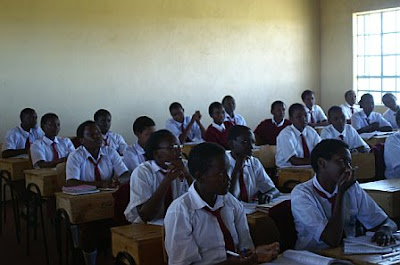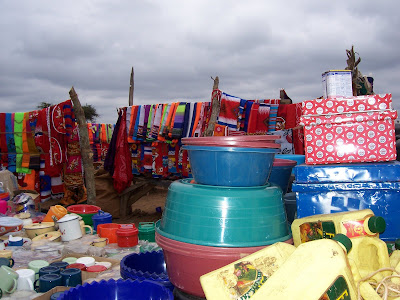



Clove cigarettes and a chat with Elena on the patio outside our room before calling it a night.
I drop the toilet seat with a bang trying to get a moth out of the bowl. I hold my breath. Paula stopped snoring. I woke her.




Clove cigarettes and a chat with Elena on the patio outside our room before calling it a night.
I drop the toilet seat with a bang trying to get a moth out of the bowl. I hold my breath. Paula stopped snoring. I woke her.

We’ve just arrived back at ol donyo wuas and are milling around the entrance when Jonathan, one of our guides, says there are Cheetah outside the lodge. We clamor into jeeps and take off in the dark. By the time we arrive behind the others, we can see long spotted legs disappearing over a small hill among the acacias.
“You just missed three,” Greg tells us, “but one is just there.” I follow where he points and see a long cat lying under a tree. It’s stretched out casually, thin and relaxed. Exquisite.




The sundowner tonight is on the top of a small hill. Canvas chairs are waiting for us in a semi-circle around a large fire. With drinks in hand, we see the land stretching out before us. Every hill seems to have a secret and ancient name.
There’s a distant sound, a chorus, getting louder. Spears appear over the hill as Maasai warriors wrapped in purple and red clothe dance and sing trance-like over the horizon. There’s Daniel. Emanuel comes from behind the drink table, throws a red blanket over his shoulders and joins the walking dance, his signature smile even wider than usual.
I quickly sit down by the fire to take it all in thinking of all the white people sitting in this spot and all the Maasai proudly showing off their fierce beauty throughout time.
"Humm rumm. Humm rumm" they sing. After circling the fire the young men stand in a tight group on the far side. A warrior steps forward and starts to jump. His tall body launches from a dead stop, rigid. His walking stick in hand, he lands bending his knees only slightly to take the shock.
A young Maasai invites LeDoux to join the dance. Convinced that girls can’t play, I’m shocked when Daniel reaches for my hand, pulls me up, and walk/dances me to the group of men. I’ve watched them closely so move my neck and body as I’d seen, jutting my neck out and stamping my feet.
“Humm. Rumm,” I join the singing. “Humm. Rumm.”
When I start to jump, Daniel pulls me down. I understand that it would be bad form to jump higher than a Maasai warrior. My second jump is low. I thank Daniel and grab my drink to steady myself from the excitement before sitting down.




It was a long exhausting trip and I’m not relaxed until the earth turns to red clay. It’s a relief after the rocky and pitted road from town. I feel even better when the red earth gives way to the black volcanic land of our mountain home.
With a shower and lunch behind me, I curl up in a chair looking at the acacia trees giving way to the open green plains and, in the great distance, Kili. I drift off listening as Kip and Michael talk as they put a puzzle together on the coffee table next to me. The hurricane lamps are lit. Hilary and Ed sit on the couch nearby and talk of love and loss.

Zebra.

Kori Bustard. Because they are so heavy, they tend to walk more than fly. Bustard means birds that walk.

It’s a long bumpy jeep ride before we arrive at the Maasai village and the open air market. I’m uncomfortable because I feel like a rich American among the poor Maasai. It’s as if anything the West brings only works if it’s money. Western clothes—jeans and t-shirts—look dirty and dingy. Traditional Maasai clothes are bright and colorful red and purple wraps that look beautiful against the dark skin and long limbs of the Maasai. The women wear elaborate beads and the warriors carry walking sticks or spears. I see Moses, my favorite guide, wearing a green linen shirt and pressed pants and realize that what they wear is irrelevant. Guides are paid pretty well. So, again, it comes down to money.

 Schools and medicine are always welcome. We visited a few schools on our way to the market. The religion that paid for the school becomes the faith of the students. Presbyterian. Catholic. Lutheran.
Schools and medicine are always welcome. We visited a few schools on our way to the market. The religion that paid for the school becomes the faith of the students. Presbyterian. Catholic. Lutheran.
Now that I want to spend my dollars at the market, I realize that I’ve foolishly spent all of my money at the little shop at the lodge. All I can do is admire the bright fabric and the Artful Dodger, Stephen, who charms and smiles for the most gum and trinkets from our party.








After wandering through the market looking at coffee, potatoes, clothes, shoes, sandals made of tires, bright patterned fabric, and children wanting, we go to the cattle market where the men are packed in a corral buying and selling cattle and goats.
Clare buys a dark brown goat for the staff at the lodge. It’s a beautiful little thing and I’m afraid it will be slaughtered and served for our dinner. LeDoux thinks the same thing so we decided to ride in a different jeep on the return trip. We ride with Moses.
The Range Rover dies a few times on the way home, once when Moses stops for me to pee behind a huge tree called the wait-a-minute because the branches catch on your clothes and stop you in your tracks until someone comes to release you from its grip. Moses being Moses, jumps the gears and gets us going from a dead stop. With the Chyulu Hills in sight, we see a group of ostrich and Moses slows down.
“Don’t stop,” We yell. “We don’t need to stop!”















 Wattled Starlings—light grey with yellow around the eyes.
Wattled Starlings—light grey with yellow around the eyes.



Bats have been reported in rooms, but so far, my roommate, Elena, and I haven’t been visited. Not true for Paula and Hilary. They share our house and had a bat this morning. Hilary’s named him George Clooney.
“You wouldn’t mind having him visit your bedroom,” she said.
After breakfast of papaya, mango, oranges, cereal, eggs, toast, muffins, sausage, bacon, coffee and tea, I talk with Wilson, the chef, and Isaac, who work in the kitchen.
He tells me that he thinks Al Gore is a good man.
“Yes,” I say, “He would have been a great president.”
Isaac, a guide, thinks that Gore can’t ever be the president because he lost an election, but I assure them that he could. He should.
I say, “We don’t like George Bush.” That’s probably not true of everyone on the trip, but I’m generalizing in Africa.
“How is your president?” I ask.
“He is a good man,” says Wilson. He explains that at least this Kenyan president spends some of the country’s development money on the people.
“Corruption is always a problem,” adds Isaac.
Sandor calls for a morning game drive.






We’re a little tired after an afternoon game drive under the African sun. Driving toward Kilimanjaro, Ron yelps as a butterfly flies into his face, searing his cheek. We’re looking at Ron when tiny specks in the distance suddenly grow. Our first herd of Zebra. And Gazelle. Wildebeest. Hartebeest. There were none and then there were many. I know Zebra from zoos and pictures. But they look more unnatural in the wild. Like black and white striped cartoon animals sticking out from the green. Moses points out the Wildebeest and Hartebeest before giving us a lesson.
Kongoni or Coke’s hartebeest can go up to two months without water. On the open plains we see two light brown and white rumps. The one with the bulging sides is pregnant. The other might be the mate. We like to think they are partners.
Zebra are non-ruminant animals like horses, and wildebeest are ruminants like cows. The animals graze together because they eat different parts of the grass. Their teeth grow in the opposite direction so they aren’t competing for the same food.
Zebras live in family groups with the stallions at the head. Their call of flight and call to gather the herd sounds like a donkey’s bray. At least the movie donkeys that I’m familiar with. Zebra stripes are like fingerprints. Moses says that the black stripes have fat underneath them that absorb heat and the white stripes repel heat so they regulate their temperature, making them drought resistant.
Africa is an evolution soup.
Bethlehem skies flood the plains as light filters through the clouds. We are surrounded by hundreds of Zebras. Two little ones wag their striped tales against their striped butts. We drive closer and a group of black and white heads looks up and walk toward us.
Everyone can’t help but squeak, “They’re so cute.”
Another mighty and goofy wildebeest shows up and bucks and twists as he runs. It’s a crazy, energy wasting way to move, more like be-wilder-beast, comic and outrageous. Legend has it that the wildebeest was the last of God’s creations so was made with the spare parts of other animals. Its head is a buffalo’s. The lump on its back is a cow’s. And it runs like a horse.
The herd is on the move as a low thunder of hooves surrounds us like wind would sound if it landed.
Moses tells us that the Burchell zebra, or common zebra, were named after the first naturalist to visit South Africa in the early 1800s, William John Burchell. The Grevy zebra was named after the President of France in 1882, Jules Grevy. I have lots of questions, but I let them go not wanting to break the spell the zebras have over me.
On our way to the lodge, back to the now-familiar trees of the Chyulu Hills, we see a bright blue roller and an orange bird with a long beak. Moses picks up a dung beetle for Ron.
From the elephant to the beetle, it’s as if the baffling worlds of cosmology and molecular biology surrounds and confounds us at every turn.